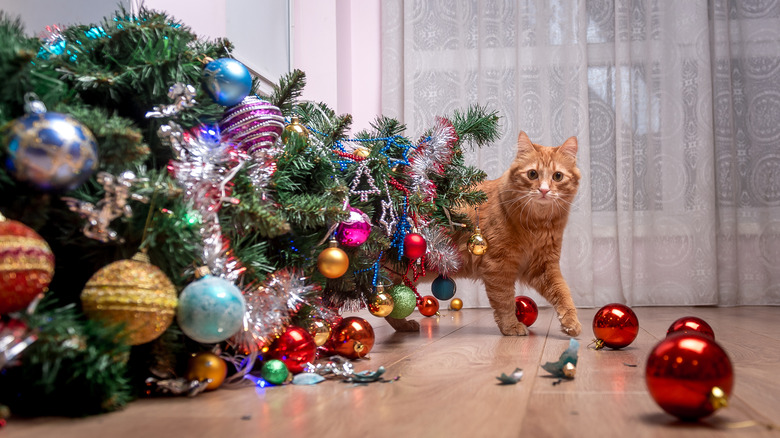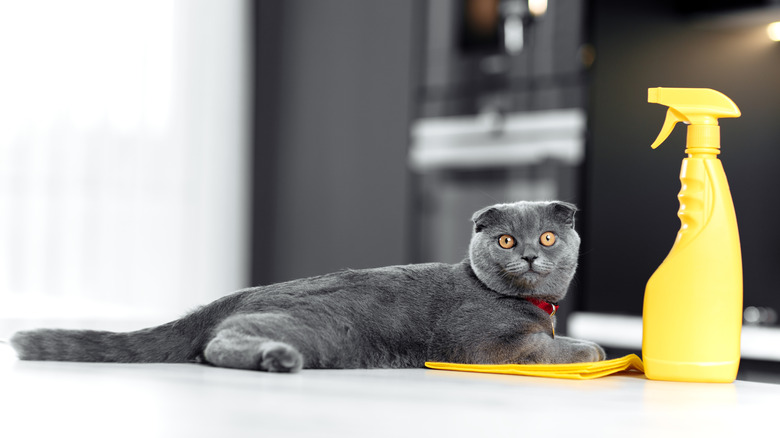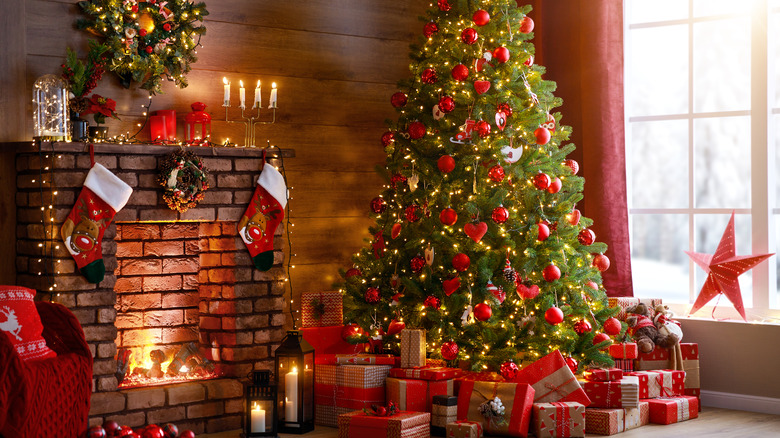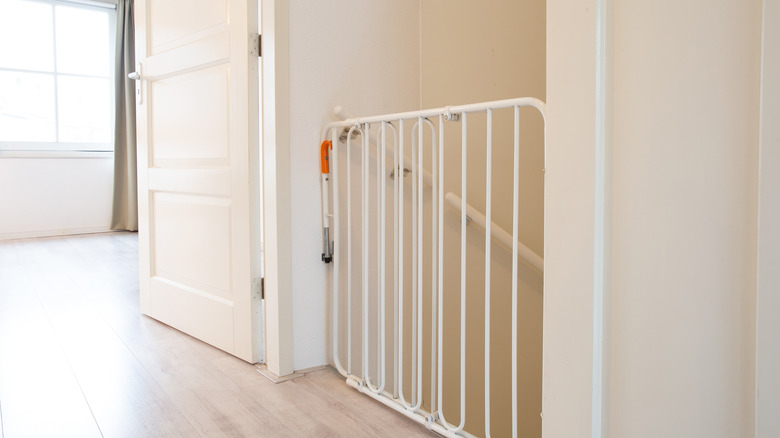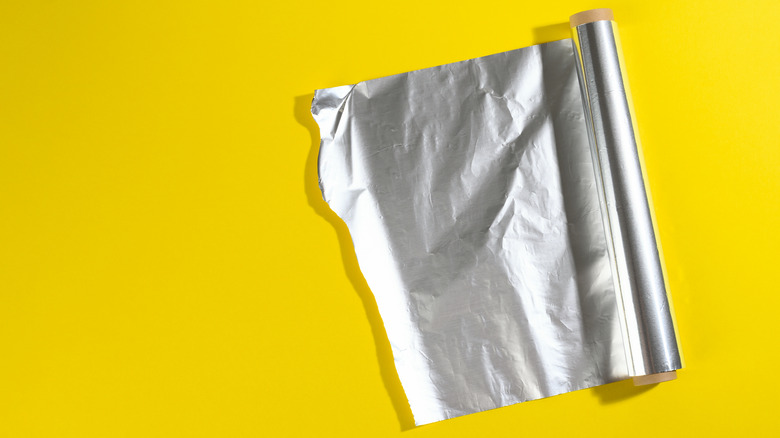5 Tips To Help Keep Your Pets From Destroying Your Christmas Tree
The holiday season is the best time of year. Many families light menorahs or decorate Christmas trees, and their pets become interested in the festivities too. However, your cat climbing the tree or your dog stealing a glass ornament to play with isn't likely part of your feel-good holiday traditions. Many pets get curious about the new decorations in your home, but giving them access to a Christmas tree is more dangerous than you may think.
Not only can your pets destroy your tree by knocking it over, but the pine needles from real trees are mildly toxic to cats and dogs. Fir and pine trees have oils that don't sit well in any animal's stomach. When ingested, they can cause excessive drooling and vomiting, according to Hartz. The degree of toxicity depends on your pet's size and how much they ingest. Purina explains that these needles can also puncture and obstruct the gastrointestinal tract. Fortunately, there are many methods you can implement to keep your pets safe from your Christmas tree.
Spray pet deterrent
Pet deterrent sprays are a natural way to keep your cat or dog from going to a specific area of your home and chewing on things. You can purchase commercial sprays from your local pet store, but you can also make your own. If you have cats you are trying to keep away from your Christmas tree, there are also motion-censored pressurized air sprays you can place nearby that will scare them away when they get too close.
Dogs and cats have a strong sense of smell, making citrus too pungent to them. Top Dog Tips recommends using citrus fruits like oranges, lemons, and grapefruits to make a homemade deterrent spray. In a bowl, mix the peels of your choice of citrus fruit with a half cup of water and 2 tablespoons of distilled white vinegar. Leave it to soak overnight, and then strain the peels out. With the mixture in a spray bottle, cover your tree and the area around it. If your pets still interact with your tree, you can try citronella. It has an acidic odor that pets don't like, according to Color Glo International. Mix one part citronella oil in a spray bottle with four parts water and apply it the same way.
Tie the tree
For pets that love to jump onto, climb, and pull your Christmas tree, the safest thing you can do is tie your tree to the wall. Adding reinforcement other than a study tree stand will keep it standing no matter what your pets do. A knocked-over tree will not only shatter precious ornaments and leave your home a mess, but it can be the start of a house fire. If the tree lands or bumps into a nearby fireplace, radiator, or candle, the dry needles can start a fire, according to Cavallo & Signoriello Insurance Agency.
You will need eye hooks and sturdy string or fishing line to reinforce your tree. Depending on how strong your pet is, you may not want to put your hook into just the drywall. Your tree will be more secure if you anchor it to a stud. Then take your choice of string and tie one end to the trunk of your tree and the other to the hook. PetDIYs.com recommends adding a second hook to your wall to stabilize it better. You should place it at an angle so the two hooks and the tree create a triangle.
Use baby gates
Baby gates will not only keep your kids from tearing into their presents too early but your pets too. If your pets don't respond well to the deterrent spray, this method will keep them away from your tree because it is a physical barrier. Deciding which kind of gate to purchase will depend on your home's layout and your pet's size. Tiny kittens and puppies can fit between the bars of some gates, so you will need to get a gate with a pattern. If you want to keep your pet out of the entire room, you can install a gate in the doorway.
Placing a multi-panel play yard around your tree will allow your pet to be in the room without reaching the tree. If you have cats that like to jump at the tree, ensure the gate is tall enough to stop them. Smart Mums Club recommends using a play yard with a wall mounting kit so your pet won't be able to knock it over. Instead of having the play yard freestanding around the tree, you will mount both ends of it to either side of your tree.
Make a skirt of tin foil
Tin foil is a resourceful way to keep your pets away from your tree. Cats are known for not liking this material because of its strange sounds and textures, but dogs are equally confused by it. Better With Cats explains that cats don't like tin foil because they have ultrasonic hearing, so the noise of it crinkling is too loud for them. Animals also don't like how light reflects off of it or the feeling of it on their paws since it can be smooth in some places and pointy when it's crumbled. Wag! also explains that pets don't interact with this material daily, making them want to avoid it.
To carry out this method, you will need a lot of tin foil. First, you can lay it on the floor around your tree like a skirt. Then wrap the trunk of your tree for extra security. Note that this method will only work as long as your pet is scared of the tin foil. Once they get used to it, you will need to implement another tactic.
Decorate with shatter-free ornaments
How you decorate your tree can help keep your pets away from it and keep them safe if they do get into it. First, you shouldn't hang anything edible on it, like candy canes or a popcorn garland. Then you should pay extra attention to where you put your ornaments on the tree. If your cat likes to swat at the decorations or your dogs like to rip them off to play fetch, you shouldn't hang them near the bottom. Instead, place your glass ornaments near the top of the tree and shatter-free ones in the middle, leaving the base empty.
Lightbulbs.com explains that shatter-free ornaments are a great alternative to glass ones because they won't break if they get knocked off your tree. They are usually made of plastic but look just as good as glass. A big plus is that they are usually cheaper as well. By decorating with shatter-free ornaments, you can simply place them back on the tree rather than having a dangerous accident with spilled glass.
